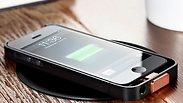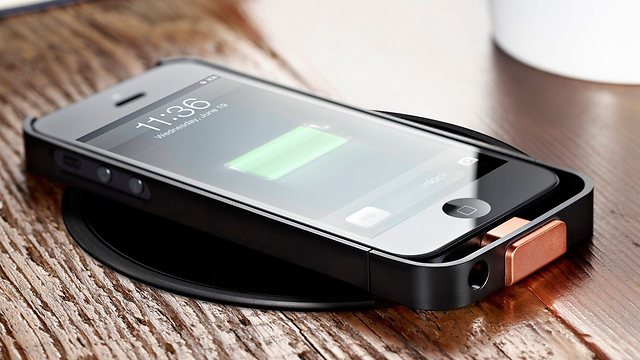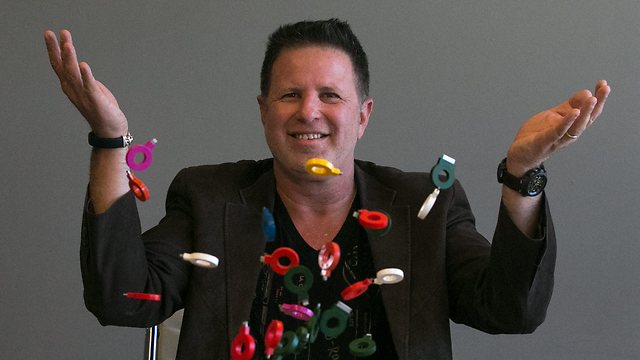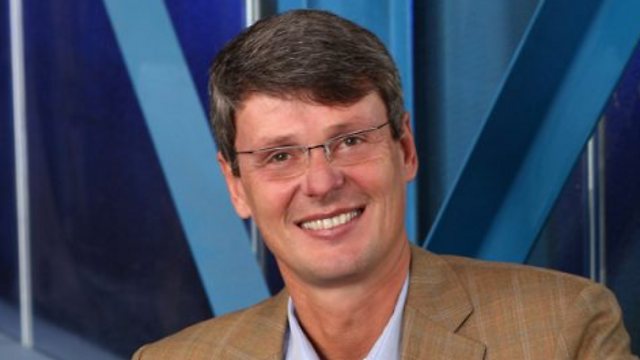
Israeli company wants to change the paradigm with its wireless charging pad
Israel's Powermat technology, which allows wireless charging of phones, has won over Starbucks and is arriving in Israel's coffee shop; new CEO says the company has global ambitions.
When examining the vision behind Israeli tech company Powermat, you must go 14 years back to the year 2001: The Starbucks coffee chain had just installed WiFi antennas at their US branches, enabling customers to surf the internet from their laptops using no cables.
The move was considered one of the most important steps in the development of wireless internet. In the years that followed, more and more laptop computers were sold with built-in WiFi, and more and more wireless networks emerged in public spaces and private homes.
Today, wireless internet has become something that goes without saying.
Israeli-based Powermat is trying to remake history, with the same coffee chain, Starbucks, but this time the star of the show will be a wireless charging pad that enables phones to fill up with battery without the use of a cable or phone charger.
And there is a reason for optimism. This past November, Starbucks installed wireless charging stations, the fruit of labor of the Israeli startup Powermat, in 200 of its branches in the San Francisco area. Last month, the charging stations also reached Starbucks branches in London, and soon the wireless charging stations will arrive at coffee giant Aroma in Israel.
Along with the Starbucks launch, Powermat announced another major move: Powermat founder Ran Poliakine will step down from his role as the CEO of the company and former Blackberry CEO Thorsten Heins will takeover as the head of the company.
The appointment of Heins as CEO shows Powermat's intent of becoming a key player in the global market. "Our goal is to become the global provider for wireless charging services in public places," said Heins in his first exclusive interview with Yedioth Ahronoth. "I emphasize: global. Not only in the US, not only in Israel, but rather in the entire world. We are building something that nobody has ever done before."
500 million dollars
The story of Powermat cannot be overlooked in the Israeli startup arena despite Powermat's Neve Ilan location near Abu Ghosh, far from the startup scene that bustles in Tel Aviv and Herzliya.
The company was founded in 2006 by Poliakine and Amir Ben-Shalom. The technological breakthrough that Powermat introduced is based on magnetic induction. The charging is completed by laying down the phone on a mat, using no cable or charger.
In 2009, Powermat made a rare choice for a startup made up of a couple of dozen of workers. The company began successfully marketing charging mats and phone cases to stores in the United States that enabled customers to charge their cellular device without a physical charger.
In 2011, Powermat established a joint initiative with Duracell, entitled "Duracell-Powermat," that took over the retail side of the project – selling Powermat's products to retailers.
However, at Powermat they understood that this was not enough. They wanted cellular producers to adapt their technology within the smartphones themselves so that there would be no need for pointless exterior accessories or clumsy phone cases.
The right way to push forward with this vision, the company believed, was by creating wireless charging spots in various public spaces. In 2012, Powermat began its pilot run with Starbucks. Powermat utilizes small circular mats placed on tables and when a smart phone is put on the mat, the phone is charged wirelessly.
With that being said, at this stage, most of the phones must first use an exterior accessory (Starbucks and Aroma chains give out a small circular ring at the register that attaches to the phone's charging port).
Powermat's estimated net worth stands at 500 million dollars as of today, however not everybody has been satisfied with the company's operations. Last year, several of Powermat's investors, among them Goldman Sachs, put pressure on the company to appoint a new CEO to replace Poliakine.
Goldman Sachs wanted to bring in an experienced manager from the outside who is familiar with the market and would be able to speed up the company's growth rate.
One of Powermat's investors, entrepreneur Christopher Burch, filed a lawsuit against Powermat, claiming that Poliakine had managed the company inappropriately.
In November, as stated, the company decided to appoint Heins as the CEO and the lawsuit filed by Burch was dropped – settling the nerves of the rest of Powermat's investors.
"We arrived at a critical point where we proved the financial value of the service. Last February, I asked the directorate to look for a new CEO and all the rest is gossip," said Poliakine of the alleged drama between the company's investors and himself.
"Not love at first site"
Poliakine (48, married + 5), resides in Motza Illit on the outskirts of Jerusalem, and has currently taken up the role as deputy chairman of the directorate. As the second largest shareholder of the company, he is still one of the dominant figures within the company and will continue to work and develop the futuristic technology.
Heins, 57-years-old and German bred, is considered a veteran manager, widely respected in the field, will take over the managerial aspect of the company. After holding various high-ranking positions at Siemens, Heins joined Blackberry in 2007 and was appointed Blackberry's CEO in 2012, having the weight of saving the veteran smart phone company, that did not adapt well to the age of the Iphone and the Android, on his shoulders. During Heins tenure, thousands of Blackberry workers were let go and in November 2013 Heins was also fired.
Now at Powermat, Heins and Poliakine will work together, perhaps as opposites who complete one another. Poliakine is considered the "creator" who will lead the advanced technological developments while Heins will be the manager, wearing a tie, in charge of closing business deals.
Heins admits that he did not immediately agree to join the Powermat team. "It was not love at first site," says Heins. "I thought it was a retail company that dealt in selling material products. But as we continued to talk, I understood that it was more than that: charging spots in public places that are controlled by a managed network that enables (us) to prove a quality service to customers," says Heins.
You joined Powermat in order to help the company grow bigger. However, Israeli startups are known for their fast exits.
"I look at the glass half full. Israel should be proud that companies are sold here. It indicates the excellence of the technological surroundings in Israel. There are Israeli companies that wanted to grow but were so good and unique in their field that someone was willing to purchase them at any price. I'm on the board of directors of the University of Waterloo (in Canada) and our President visits the Technion-Israel Institute of Technology several times. We speak a lot of Israel's success in creating a good atmosphere for education, startups, and venture capital funds."
How is it working at a startup after years of working at a huge corporation?
"It was a conscious decision, because I worked at large corporations my entire life and the opportunity to build-up something small appealed to me. Yes, it is a huge difference. You do not have a staff that tells you how your day is going to look, and I sit in a small office and have to make my own coffee. It's fun because it releases you from exterior things and from bureaucracy and allows you to be close to the heart of the company."
What are some of the lessons you've learned in your past positions?
"The main lesson I've learned is that you cannot fall into stagnation. If someone says, 'This is what we are, this is what we do and this is how we will remain in the future,' it is most likely the first step towards failure. A company must ask itself all the time what is expected, what is changing and how it can adapt itself to the new world. This is a fast-paced industry, and you must always have the paranoia that you are not fast enough."
You had to take difficult steps at Blackberry, including firing people.
"When I came into the position of CEO, the situation was very dark and I had to take very difficult steps. A lot of respect must be given to the workers, even those that were forced to leave. It was also difficult for me personally. I had to take a year to breath and to think to myself what I wanted to do. During my time at Blackberry I neglected my family; I had no time for them. I returned to Germany to spend time with them. It teaches you that the world is about more than just work and business
Paradigm shift
Despite the Starbucks deal, Powermat's success is far from assured, as it has competitors. There are currently several competing standards in the world attempting to "determine" how wireless charging technology will work. Each of them wants to be the universal standard. Powermat promotes its standard, called PMA, and led the formation of a consortium to that end. But Powermat is competing with a technology standard called Qi, which is already widespread. Many smartphones, including those produced by Samsung, Nokia, and LG, have used the Qi standard for wireless charging technology for years.
Powermat's technology is soon expected to be used in leading smartphone models as well. This "standards war" has delayed the entry of wireless charging into the marketplace. Everyone is afraid to gamble on a particular standard for fear that it will be on the losing end.
Are you on the right side of the standards war?
"The question isn't who will win the war," says Heins. What matters is that we are in a process of convergence and merging of the standards. Powermat isn't sitting by the sidelines, but is very active in the process of this convergence. You don't get into Starbucks if you are sitting on the sidelines. I wouldn't have joined the company if I thought it was on the sidelines."
Powermat's critics say the existing wireless charging technologies do not provide sufficient freedom and flexibility for the consumer. They may eliminate the mess of cables, but consumers must still place the device on a special surface, which is connected to a power outlet with a regular cable. If the smartphone is moved lightly or is picked up, the charging stops. Therefore, many claim the real revolution will occur when new technology is developed, one that manages to "project" electricity over a small distance, allowing remote charging.
"For 150 years, we were used to shoving a plug into a socket. Now we are changing the paradigm," says Poliakine. "We are supplying the consumer with a more efficient and convenient way to charge their phone. Of course, we are open to new technologies, but right now there are question marks surrounding their efficiency, cost-effectiveness, and safety – because this is energy that is distributed throughout a room and meant to charge the device without hurting you."
Heins adds: "The question is which technology is the most practical, efficient, and energy-saving. When you project energy into a room, you lose a lot of it on the way. We don't want to waste energy. We want to build a global charging network. We will be happy to accept any technology that answers these requirements."
So what's next? A wireless charging empire in Neve Ilan?
"The vision is to become a large company in its own right," says Poliakine. "This is a once-in-a-lifetime opportunity to build a company that will be remembered for many years."













